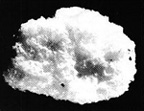for Broilers (Chickens)
A review by of work by
"Poultry litter is an integral element in providing the proper environment for efficient poultry production. Litter functions as a medium for fecal decomposition, moisture absorption, and as insulation between the ground and live birds. Thus, it is important to maintain quality litter integrity during a flock growth period.
Past research has shown that optimal litter conditions will enhance bird weight gain and decrease processing condemnation rates.
Characteristics to look for in an optimal litter include: low moisture and pH, low ammonia production, and a high reuse potential. An ideal litter, regardless of age, should be firm in the hand, and not wet and sticky. The litter material should be light, absorbent, inexpensive, and compatible for use as a fertilizer or livestock feed when disposed of."
It is economically important to maintain litter quality. Poor litter quality has been correlated with reduced growth, decreased feed conversions, increased respiratory disease, increased hock burns and breast buttons, and increased incidence of leg disease. Most of these harmful effects are due to one aggravating litter management problem---moisture accumulation."
Thus began the first of several research projects funded by The Perlite Institute and conducted by Dr. Sheila E. Scheideler and the North Carolina State University's Department of Poultry Science in 1989 and into the early 1990's.
In the final analysis, the perlite did very well. In further testing, it was tested as a feed additive, and this too well.
Since doing this research, Dr. Scheideler has moved to the University of Nebraska where you can contact her at http://animalscience.unl.edu/faculty/scheidel.htm
Perlite is not a trade name but a generic term for naturally occurring siliceous volcanic rock. The distinguishing feature which sets perlite apart from other volcanic glasses is that when heated to a suitable point in its softening range, it expands from four to twenty times its original volume. This expansion process is due to the presence of two to six percent combined water in the crude perlite rock. When quickly heated to above 1600 F (870 C) the crude rock pops in a manner similar to popcorn as the combined water vaporizes and creates countless tiny bubbles in the softened glassy particles. It is these tiny glass-sealed bubbles which account for the amazing lightweight and other exceptional physical properties of expanded perlite. The expansion process also creates one of perlite's most distinguishing characteristics: its white color. While the crude perlite rock may range from transparent to light gray to glossy black, the color of expanded perlite ranges from snowy white to grayish white. Expanded perlite can be manufactured to weigh from 2 lbs/ft3 (32 kg/m3) to 15 lb/ft3 (240 kg/m3) making it adaptable for numerous uses, including filtration, horticultural applications, insulation, inert carriers and a multitude of filler applications. If you need any more information or think we can help in any way, please call us or contact us at:
The Schundler Company
Back to Industrial Products Main Page
Dr. Sheila E. Scheideler
North Carolina State University
Department of Poultry Science
and paid for by
The Perlite Institute
Written by Bruce Schundler
Background Information about Perlite

10 Central Street
Nahant, MA 01908
732-287-2244 or www.schundler.com